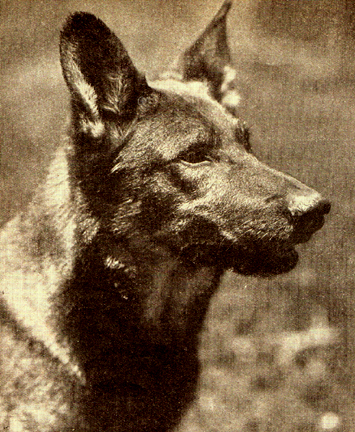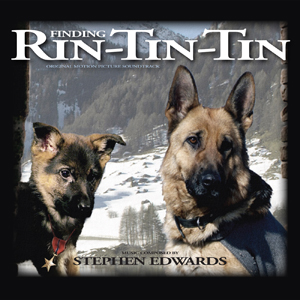
Rin-Tin-Tin is a trademarked term.
Who knew?
At least, one Daphne Hereford of Crocket Texas owns the tradmark rights to "Rin-Tin-Tin" as it applies to "live puppies."
No word on what the US trademark office has to say about marketing dead puppies as "Rin-Tin-Tin."
A US distributor is releasing a 2007 Bulgarian flick, Finding Rin-Tin-Tin on DVD, and Ms. Hereford is suing to have all copies of the film
It is not clear to me how a trademark on a term as it applies to the sale of live puppies affects the use of the proper name in a movie which, while it may take liberties with the facts, is roughly a work of art depicting a historical personage. Caninage. Whatever.
But according to the Houston Chronicle
I mean, I know! Just compare these superior "linebred" descendants of the original Rin-Tin-Tin:According to the new lawsuit, Hereford's trademarks on the Rin Tin Tin name include its use for live puppies, educational presentations, a mail-order fan club, magazines, playing cards, children's books, dog clothing and dog food.
Hereford's Houston-based lawyer, Karen Tripp, said the current case is about the dilution of trademarks. "Daphne has a very strong trademark in Rin Tin Tin. Her registrations are incontestable," Tripp said.
The possible remedies are varied, Tripp said. "At the very least, there has to be a notice that these are not Rin Tin Tin dogs but actors. Her dogs are beautiful and well-trained, and she wants it clear in the marketplace," the lawyer said.
Daphne Hereford's "history" page
With these hideous counterfeits:

(Hint: in Eastern Europe, the wicked commies did a very good job of breeding real working GSDs, the better to oppress their population, Dearie. Dog shows were a bourgeois no-no.)
So if I make a film about the life of Rinty contemporary Errol Flynn, do I have to cast Sean Flynn to play Pop-Pop? If I wanna make a movie about Oscar Wilde, am I SOL?
There's so much not to like about this sheet-shedding tempest in a steel bowl:
• Ms. Hereford's inbreeding program
• Her "eye" for a German shepherd dog, and delusions that the beasts she owns today bear any more resemblance to great-great-great-great-great-great-great-great-great-great Grandad than does any other German shepherd
• $3500 for an indifferently-bred shepherd pup, sold on a sterilization contract
Vying against
• What promises to be a truly vile direct-to-video animal-themed movie, which I now feel compelled to at least rent
You can patent a mouse or a yeast. I don't agree with it, but that's the law as it is. You can protect a bloodline of animals with hardass contracts, and it's the obligation of the civil courts to enable you to enforce those contracts.
Ownership of the name and story of a historical figure, by virtue of ownership of some of his descendants, and an aggressive trademarking campaign?
Oscar Wilde did have two sons. The younger one, Vyvyan, had a son, Merlin, and Merlin's son Lucien was born in 1979. He's a computer programmer, though, and not an actor. (I love Wikipedia!)
ReplyDeleteBetty
Oh Man!
ReplyDeleteThat's what I get for pulling what seemed like a "safe" example out of my butt.
Google it first ... google it first ... google it first ...
Ohhhh - you are sooo screwed now. Miz. Daphne is gonna sue you for PUTTING THE WORDS "Rin Tin Tin" on your blog!
ReplyDeleteCopyright infringement! Plagiarism! Slander! Libel!
Hey, maybe you oughtta give Jerry Sienfeld's attorney a call?
the US laws on trademarks are very strict.
ReplyDeleteIf you don't enforce your rights, you lose them.
That's why big companies go after small ones, or individuals. To the average person, it seems unfair. But the law leaves the big companies with no choice.
To expand on EmilyS' comment, the courts may decide that since you didn't enforce your trademark ownership the last time, you can't enforce it the next time it's used without permission. In this case, the trademark holder should have been approached about licensing the term.
ReplyDeleteUsing the term in this blog would be considered fair use. The trademark would be infringed if it was used without permission for monetary gain, or in such a way that the use could be confused with the original, like if another breeder used it. It may seem funny and petty to you, but this kind of thing is no joke. For most dog breeders, their kennel name IS a trademark, whether they have filed it with the trademark office or not (statutory trademark), and misuse of it is a no no. I know breeders who have used lawyers and even gone to court to keep another breeder from using their kennel name to sell dogs (as in 'dogs from these lines.') How is that any different?
"I know breeders who have used lawyers and even gone to court to keep another breeder from using their kennel name to sell dogs (as in 'dogs from these lines.') How is that any different?"
ReplyDelete********
As I understand it, the trademarks are specific to particular uses of the term. Look at the list. Playing cards. Dog clothing. Etc. Says nuthin' about no movies. I strongly suspect that she (or her grandmother) was denied trademarks on motion pictures.
I might win in court if someone else started selling "Brandywine English shepherds" -- even though that is not a registered trademark, just a kennel name recorded with the registry. I would not -- even if I did register the trademark -- if I challenged someone who is selling "Brandywine morkie-poos."
I would certainly be laughed out of court if I sued someone who was selling Brandywine peach preserves.
Aside from that, the fact is that Rin-Tin-Tin is the proper name of a historical figure.
I cannot trademark "George Washington."
I might be able to trademark "George Washington brand cherry chutney."
That wouldn't give me a leg to stand on when someone made a movie about George Washington and I took exception because my chutney did not get a product placement.
The lineage of the dogs that are incidentally owned by the trademark owner is irrelevant.
She could sell German shepherd puppies from any source and any lineage as "Rin-Tin-Tin" puppies. As far as any of us knows, she does. Who could tell?
And of course, the original Rin-Tin-Tin was used widely at stud; he'll have remote descendants everywhere, mostly unbeknownst to their owners. Were someone to do pedigree research and factually state "This dog has Rin-Tin-Tin fifteen times in his ten-generation pedigree" he'd be protected in saying so.
If there were any DNA available from the original Rin-Tin-Tin, a paternity test could be run on the descendents.
ReplyDeleteThe only nice thing I can say about her is that her dogs do have very sweet pet temperaments- not nervy and not spooky at all.
ReplyDeleteMind you, they have less drive than Kaylee. But they're very sweet dogs. Too bad about the crappy breeder.